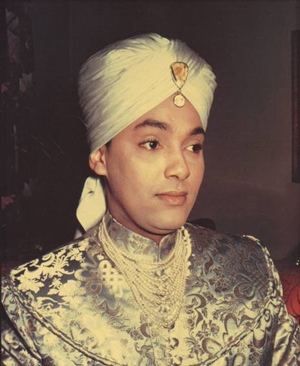Exotic Korla Pandit hid race under swami persona
SFGate
2015-08-15
Jessica Zack
Eric Christensen grew up in San Francisco in the 1950s and remembers his mother, “like a lot of women then, being transfixed by Korla Pandit on television. He wore a jeweled turban and had these mesmerizing eyes that made women feel he could see right through them. Korla was this otherworldly, captivating guy, and we all thought he and his music were from another land.”
Christensen, who lives in Mill Valley, and his former KGO TV colleague John Turner of Berkeley have chronicled Pandit’s life story in their new documentary “Korla,” which has its Bay Area premiere at San Francisco’s Museum of the African Diaspora on Aug. 20.
From his first 1949 episodes of “Adventures in Music” on Southern California’s KTLA, Pandit rode an almost 50-year-long wave of success — as a TV sensation, prolific recording artist (13 albums with Berkeley’s Fantasy Records) and “grandfather of exotica music” — based not only on his keyboard prowess but on his enigmatic swami persona.
With his heavily kohl-rimmed eyes and upturned half-smile, Pandit coaxed unusual sounds from the Hammond B-3 organ, playing “musical gems from far and near” — faux-Polynesian sounds, Hawaiian war chants, “hypnotiques” — while extolling the virtues of “divine consciousness” and “the universal language of music.”
Yet, unbeknownst to his legions of fans until after his death in Petaluma in 1998, at age 77, Pandit’s hypnotic Svengali look and supposedly Hindu name were part of an expertly crafted fiction of self-invention. A magazine profile by R. J. Smith in 2001 revealed that Pandit was actually African American, a minister’s son born John Roland Redd, from Columbia, Mo…
…The film incorporates interviews with music and sociology experts — including Carlos Santana (who likens Pandit to Miles Davis), The Chronicle’s Radio Waves columnist Ben Fong-Torres and UC Berkeley Professor Emeritus Harry Edwards — as well as with Pandit’s nephew Gary Cloud, to examine, says Christensen, “this amazing act, even by show business standards. This wasn’t an act that occurred onstage for an hour or two, this was 24/7, all through his life. Korla put on this persona and couldn’t take it off. Living a lie on a daily basis must have been very difficult.”
“Korla’s life story illustrates what African Americans knew at the time: ‘If I can be anything other than black, my life could change dramatically,’” says Stanford University Assistant Professor of History Allyson Hobbs, whose new book “A Chosen Exile” explores the stories of individuals who passed as someone else racially from the late 19th century through the 1950s. “If they could just twist people’s perception of them even one degree — in this case, from black to another minority — doors previously closed would open.”…
Read the entire article here.



